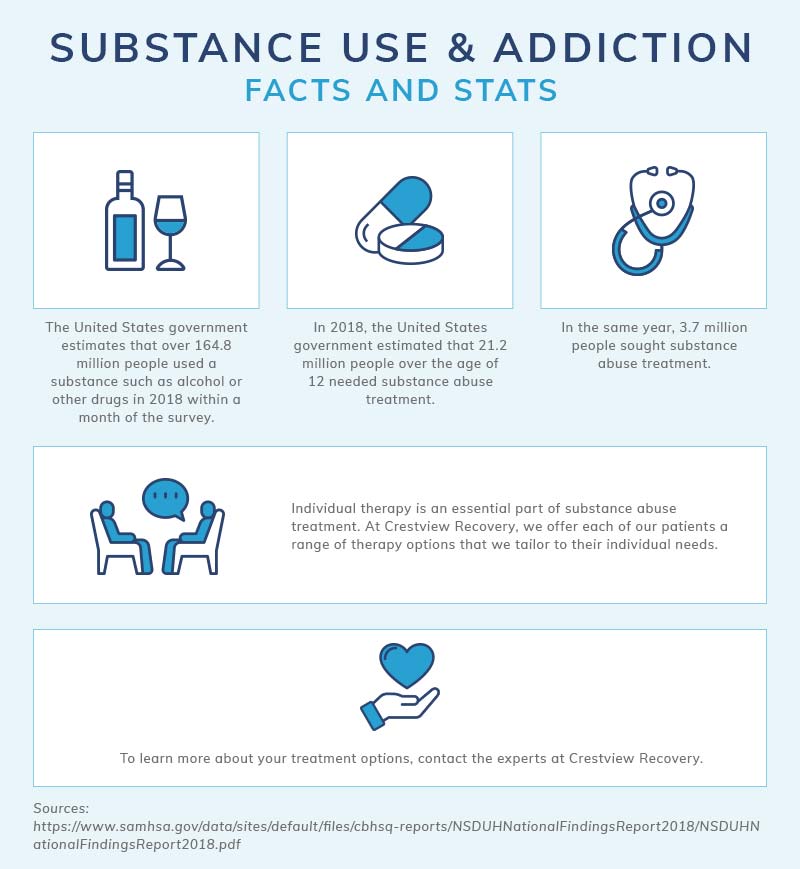One of the most popular and effective methods of treatment is individual therapy for addiction. Working with a therapist’s undivided attention and focusing on overcoming substance abuse based on your personal history can provide many benefits. Take a closer look at why one-on-one therapy works and how it can be beneficial to those in addiction recovery.

Healing Begins Here
How Individual Therapy Works For Substance Abuse
Individual therapy can address the specific problems a person might have. In the world of addiction treatment, common problems might be the shame that society associates with drug or alcohol addiction, the difficulty of recovery withdrawal, or struggles with relapse. Certain modalities of individual therapy, such as cognitive-behavioral therapy, focus on the actions people take that lead to unfavorable outcomes. Other forms, such as dialectical behavioral therapy, help to build resilience skills that help with overall healing from substance abuse.
Above all, individual therapy works by allowing patients to have a safe space where they can share information without judgment. Therapists are in a unique position where patients trust them with sensitive information. Patients know that their therapists won’t pass judgment or cause problems in their relationships or careers based on what is said in an individual session. This is often essential support when recovering from addiction, rebuilding relationships with family members, and other aspects of healing from substance abuse.
Individual therapy enables an individual to achieve a more personal connection with an addiction therapist than group therapy. Individual therapy sessions are completely private, which can encourage patients to be more open and honest about their feelings and experiences. Those who are hesitant to share during group therapy sessions may have less trouble in individual therapy. This willingness to open up is crucial when working through addiction recovery.
For example, not all patients feel comfortable sharing their past trauma with a large group. However, a history of trauma might be a key piece of information to help individuals recover from addiction. Similarly, patients might not want to share that they are having suicidal thoughts with their peers. Revealing this to a therapist is much easier. In individual therapy, there is a safe space and understanding of privacy.
9.9 million people misused opioid pain relievers in 2018.
Do not wait to get individual treatment for addiction. Contact Crestview Recovery in Portland, Oregon today so we can help you get treatment.


Individual Therapy Encourages Better Communication Skills
In one-on-one therapy sessions, patients are able to greatly improve their communication. Therapists ask specific questions that help their patients share information. Additionally, patients have to think critically and be specific about their responses. This form of therapy also allows the patient to feel heard and understood by someone. This is not always easy to do while in recovery for substance abuse.
Do not wait to get individual treatment for drug or alcohol addiction.
Contact Crestview Recovery today to learn more about our addiction treatment programs.
Individual Therapy For Addiction Can Reach Deeper Than Group Therapy
Group therapy is a wonderful way to feel connected to peers and to discuss general topics. For more in-depth conversations and exploration into life history, individual therapy is ideal.
In an individual therapy setting, patients can bring up specific issues to their therapist that might only apply to them. Parenting, relapse prevention techniques, life events, or mental health can all be the focus of therapy sessions in this more private therapy setting.
Group therapy is a wonderful way to feel connected to peers and to discuss general topics. For more in-depth conversations and exploration, individual therapy is ideal. The therapist is only charged with providing therapy to one person, and so the topics of the therapy session (or the therapy modality itself) can’t be as easily derailed.

Individual Therapy For Addiction Can Help With Other Forms of Substance Abuse Treatment
For example, dialectical behavioral therapy helps to build skills in tolerating stressful situations. This is no doubt helpful in situations where one may be tempted to turn to substance abuse to cope with stress. But within addiction treatment, it may also help within a session of family therapy when you’re hearing about how your use of drugs affected someone you care about.
In sessions of individual therapy, it’s possible to safely roleplay out situations that eventually led you to substance abuse. The safety and intimacy of individual therapy work allows the individual to reflect and ask questions that may feel wrong in a family therapy session (or a group setting in general).
Individual Counseling is Designed For Individual Needs
Co-occurring disorders, also mental illnesses that coincide with substance abuse as a dual diagnosis, can easily be addressed in individual counseling. Often related to the root causes of addiction, co-occurring disorders can include depression, anxiety, ADHD, and more. In individual sessions, a therapist can provide targeted support to help in recovery that takes the condition into account.
Privacy is one of the key benefits of individual therapy, and many individuals find it easier to discuss the root causes of substance abuse in an individual therapy session where they know they won’t be judged. For example, while group therapy can be helpful for alcohol addiction, someone may not be comfortable talking about why they’re in alcohol abuse treatment in front of strangers in a group setting. Individual therapy allows for people to practice this in front of a counselor who may have heard many stories about how alcohol has affected people.
Deeper Than General Group Therapy
In a one-on-one setting, patients can bring up specific issues that might only apply to them. Parenting, relapse prevention techniques or mental health can all be the focus of therapy sessions in this more private setting.
Group therapy is a wonderful way to feel connected to peers and to discuss general topics. For more in-depth conversations and exploration, individual therapy is ideal.
Types of Therapy For Substance Abuse
There’s no need to confine yourself to one therapy on your journey to recovery, one type of therapist, or even one type of therapy session. Therapy options you can choose so you can get started on mental health disorder treatment involve:
- Cognitive-behavioral therapy: This type of therapy requires you to look deeper into the cycle of emotions, thoughts, and actions. In CBT, we will help you to address negative cycles and replace them with healthy ones.
- Dialectical behavioral therapy: During this therapy, you will work with a group to see how your negative emotions, thoughts, and actions influence your social interactions. From there, you can work on building and repairing healthy relationships.
- Yoga therapy: Yoga therapy is an excellent option to treat your body, mind, and soul. Moreover, you will learn how to address stress, treat physical pain, and integrate your body and soul.
- Mindfulness meditation therapy: This therapy, in combination with cognitive-behavioral therapy, is an excellent option to teach you to control your thoughts. It may not be clear how this can help with recovery from substance abuse. But the control taught by mindfulness meditation therapy can help individuals see the origins of distressing thoughts (not unlike cognitive-behavioral therapy).
Heal From Substance Abuse at Crestview Recovery
Regardless of what your addiction is or how long you have suffered from it, the drug and alcohol rehab recovery staff at Crestview Recovery want to help you. Contact us at our facility in Portland, Oregon, you can take the first steps toward recovery so you can achieve the life you deserve.
Stop living your life in the shadow of addiction.
Contact us at (866) 262-0531 to learn more and start your journey of recovery.





















